Welcome to the award-winning The Hill Country Podcast. The Texas Hill Country is one of the most beautiful places on earth. In this podcast, Hill Country resident Tom Fox visits the people and organizations that make this the most unique area of Texas. Join Tom as he explores the people, places and activities of the Texas Hill Country. In this episode, I have local Hill Country artist Deanna Eixman. Highlights include:
· Growing up and going to college at Baylor University. College studies.
· Where did you live in Colorado, and how did that experience impact your art?
· Why did you move to Hill Country?
· Using art as a healing therapy? Working with victims of human trafficking.
· How would you classify your work?
· Landscapes and color seem like influences. If so, how?
· What is your “Contemporary Realism Collection.”
· What is “Now and Forever Collection”?
· How about “Pet Portraits”?
For more information on Deanna Eixman and her art, click here.
Deanna Eixman Fine Art on Facebook
Deanna Eixman on Instagram
Tag: human trafficking
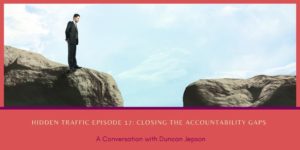
Duncan Jepson is Managing Director of Liberty Shared. Starting as a documentary filmmaker, he saw the stark contrast between the ones being filmed and the excited executives. He joins host Gwen Hassan to discuss how Liberty Shared is helping organizations take action against human rights violations.
Liberty Shared’s main focus is data gathering and research and intelligence sharing – gathering information about what happens on the ground then communicating that to individuals, groups, and organizations that can do something in response. “We’re not interested in statistics [or] estimations,” Duncan shares, “we’re interested in data as it is accurate and can produce actionable information and evidence.”
The system is flawed and incomplete, he adds. The global economy is profit-oriented, so much so that it operates at the expense of other people, and the chance of anyone being held accountable for their part in it is very limited. Liberty Shared is working to identify those gaps of accountability and close them as much as possible.
Resources
Duncan Jepson on LinkedIn
In this episode of the Compliance Week 2022 Preview Podcasts series, Matt will discuss some of his presentation at Compliance Week 2022, “The Human Factor of ESG.” Some of the issues he will discuss in this podcast, and his presentation are:
- The state of modern slavery and examining the impact on the global supply chain.
- Working to disrupt the human slavery trade.
- The ways that compliance professionals can remain vigilant within the human rights sector.
I hope you can join me at Compliance Week 2022. This year’s event will be May 16-18 at the JW Marriott in Washington DC. The line-up of this year’s event is simply first-rate, with some of the top ethics and compliance practitioners around.
Gain insights and make connections at the industry’s premier cross-industry national compliance event offering knowledge-packed, accredited sessions and take-home advice from the most influential leaders in the compliance community. Back for its 17th year, compliance, ethics, legal, and audit professionals will gather face-to-face to benchmark best practices and gain the latest tactics and strategies to enhance compliance programs and many others to:
- Network with your peers, including C-suite executives, legal professionals, HR leaders, and ethics and compliance visionaries.
- Hear from 75+ respected cross-industry practitioners who are CEOs, CCOs, regulators, federal officials, and practitioners to help inform and shape the strategic direction of your enterprise risk management program.
- Hear directly from the two SEC Commissioners, gain insights into the agency’s enforcement areas, and walk away with guidance on remaining compliant within emerging areas such as ESG disclosure, third-party risk management, cybersecurity, cryptocurrency, and more.
- Bring actionable takeaways back to your program from various session types, including ESG, Human Trafficking, Board obligations, and many others, to listen to, learn and share.
- Compliance Week aims to arm you with information, strategy, and tactics to transform your organization and your career by connecting ethics to business performance through process augmentation and data visualization.
I hope you can join me at the event. For information on the event, click here. As an extra benefit to listeners of this podcast, Compliance Week is offering a $200 discount on the registration price, and enter discount code TFLAW $200 OFF.

Lisa Thee is the Data for Good Practice Lead at Launch Consulting Group. She is CEO at AMP Solutions, where she provides advising, consulting, and strategy services for businesses. She also serves on the board of directors and as an advisory board member for several organizations, and is a TEDx Speaker. Lisa joins host Gwen Hassan to discuss the evolution of digital safety, and the role of digital platforms in both the persistence and end of human trafficking.
Digital platforms have been used as a vehicle for recruiting victims of human trafficking and/or child sexual exploitation, in part due to the absence of standards and regulations for digital safety. There isn’t a strong business incentive to do the right thing in terms of trust and safety, Lisa claims, because it opposes shareholder value and growing your audience. “I think we’re finally at a place as a society where we’re ready to [abandon leveraging] our next generation’s mental and physical health to maintain the status quo,” she says.
However, a delicate balance must be struck; making adjustments to trust and safety will directly impact privacy, and vice versa. There is no one-and-done method to solving this problem, as it has never been about technology, but instead, ethics. On a related note, advocating for compliance and ethics from a financial standpoint promotes a win-win scenario for business and for the greater good.
Resources
Lisa Thee on LinkedIn | Twitter
LisaThee.com

Jeff Bond is the Director of Strategy and Design for the Global Fund To End Modern Slavery, an international fund that mobilizes resources, evidence and partnerships to end modern slavery. He is passionate about making a positive social and business impact, and has spent a great deal of time in other countries broadening his perspective. Jeff returns to Hidden Traffic to discuss how modern slavery drives climate change.
If modern slavery were a country, it would be the third biggest source of carbon emissions in the world, after China and the US. This is because the industries and geographies that contribute the most to climate change use forced labor extensively, due to the increased vulnerability discussed in the last episode. Simply deciding to pull support from these industries will not be enough to end the issue of modern slavery, as it leaves behind more vulnerable people; people who can be easily manipulated by others seeking to make money off of them.
GFEMS is trying to strike the right balance of policies and enforcement to eradicate the conditions that power modern slavery, while still encouraging local growth and empowerment. To achieve this, however, many industries in particular need to undergo a complete overhaul of the way they do business.
Resources
Jeff Bond on LinkedIn
Global Fund To End Modern Slavery
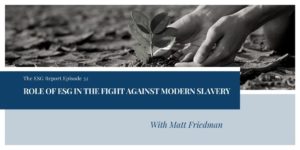
People often ask, ‘Which companies are bad and shouldn’t be bought from?’ In reality, there is no way of determining that, across the board. Some companies getting called out doesn’t mean that others aren’t having issues. “ESG has that potential to introduce the baseline we’re all looking for,” says Matt Friedman, and in this episode, he and host Tom Fox discuss ESG’s role in the fight against modern slavery.
What is Modern Slavery?
Modern slavery is defined as a situation where a person is tricked and deceived into a job situation where they can’t get out, and don’t get paid. Matt reveals that it often happens to migrants who are taken from one place to another, and that there are about 40 million people estimated to be in modern slavery around the world, “There are more slaves today than any other time in history.”
While sex trafficking is a large component of modern slavery, it’s actually a much broader issue. Many Latin Americans who manage to get into the US are highly exploited; they’re picking our tomatoes and oranges, and they don’t get paid at all because they’re indebted, and domestic cleaners are in situations where they’re locked in the house, not able to do anything to protect themselves or escape.
The Work of The Mekong Club
The Mekong Club is a non-government organization set up in Hong Kong to work with the private sector in a positive and supportive way, and to help them understand the issue of human trafficking and what needs to be done to address it. Matt says, “Our role is to work with them, not against them.” With some organizations, the only way to get the private sector to take action is to find something they’re doing and embarrass them enough for them to implement change. The Mekong Club isn’t that kind of organization. Instead, they try to offer the services and consultations needed by the company in order to protect themselves.
About 32 tools are available, offering remedies that come from private sector companies, themselves. One of the first things done with companies is a self-assessment; based on the results, Mekong Club rates the extent to which they are achieving what needs to be done in terms of modern slavery, and works with them in order to mitigate the problems. “This is what they say they need, and whatever it is that they need, they get.” he tells Tom.
The ‘S’ in ESG
In Matt’s opinion, the ‘S’ in ESG has always been the orphan. Since it includes human rights, modern slavery, and safety, it is viewed by many as not having measurable, potential risk. As a result of this, a lot of modern slavery indicators – what Matt calls ‘superficial S indicators’ – aren’t up to par with other areas of ESG. Matt and The Mekong Club strive to change that, “We have to have companies actually demonstrate they’re actually doing something when they say they’re doing it.”
The Road to a Robust Company
The Mekong Club focuses on various things when it comes to improving a company – many of which are easy, cost-efficient, and can be implemented by you now, in your own companies. Some of these include:
- Making the leaders understand that modern slavery is a relevant and important issue.
- Having a point person or team of individuals within the organization that are ‘focal people.’ They would be better trained and receive whatever tools/instructions.
- Issuing policies and procedures: e.g. Do you have a zero tolerance statement? Do you have a mechanism in place to ensure that workers’ voices are heard? If you find forced labor, how do you remediate it?
- Developing tools.
RESOURCES
Matt Friedman | Where Were You?: A Profile of Modern Slavery
The Mekong Club | The Mekong Club paper | PDF summary of our tools | Here is our most recent membership brochure | The mini-assessment tool
The compliance intersection with Environmental, Social, and Corporate Governance (ESG) continues to drive many initiatives in both the ESG realm as well as compliance. One of the key areas is in found in corporate Supply Chain, particularly around human rights, human trafficking and modern slavery. The Uyghur Forced Labor Prevention Act puts additional pressure on companies who do business with China to be able to affirmatively show no goods or services were produced through forced labor involving the Chinese Uyghur population, much to the consternation of the Chinese government. Most compliance professionals depend on language in supplier contracts which certify that no products are the result of slave labor. A New York Times (NYT) piece, entitled U.S. Effort to Combat Forced Labor Targets Corporate China Ties, reported, “One of the biggest hurdles for U.S. businesses is determining whether their products touched Xinjiang at any point in the supply chain. Many companies complain that beyond their direct suppliers, they lack the leverage to demand information from the Chinese firms that manufacture raw materials and parts.” However, that most basic approach is no longer adequate.
In a recent Sloan Management Review article, entitled “Does Your Business Need a Human Rights Strategy?,” authors N. Craig Smith, Markus Scholz and Jane Williams took a solid look at both the risk side of this equation as well developing a corporate strategy to deal with the issue. Over the next couple of blog posts, I will be exploring the article in the context of the compliance professional and a corporate ESG strategy.
While the Chinese response may be painful, it will frankly pale next to the response from the US government and the buying public. With so much increased attention to human rights, the authors believe “businesses that turn a blind eye to violations that occur in their sphere of operations face the risk of being exposed as morally complicit as well as vulnerable to legal action and reputational harm. That’s why it’s critical for companies to have a human rights strategy and proactively consider when and how to take the action needed to fulfill their moral obligations; meet shareholder, customer, and employee expectations; and keep other stakeholders satisfied.”
Three Categories of Human Rights Violations
The authors believe there are three broad categories of human rights issues. They are:
- Abuse in the way a company’s products or services are made or delivered. This includes abuse by suppliers or contractors or within a company’s own operations. Although most western companies believe this is not a problem for them, a UK investigation found a slave labor operation within the country itself, which was supplying food products to such UK retailors as Tesco, Sainsbury’s and others.
- Abuse in the way a company’s products or services are used. This includes companies that find themselves complicit when customers employ their products or services to do so — if not legally complicit, then at least guilty in the court of public opinion. The obvious example here are the digital surveillance systems sold to Chinese security agencies and used to implement a mass surveillance program against minority groups while creating an overall surveillance state within the country.
- Abuse by regimes where the company operates. This may be one of the trickiest to navigate. Obviously working with governments is an important business component but even working with the US government can be trick as McKinsey found out when it contracted with Customs and Borders and “Media reports suggested that the consultancy had been redirected to assist in former President Donald Trump’s clampdown on illegal immigration and was responsible for money-saving recommendations that included cuts in funding for food, medical care, and the supervision of detainees.”
Obligations to Address Human Rights
Both compliance and ESG have driven the discussion on the role of the corporation in dealing with this issue. The Business Roundtable’s Statement on the Purpose of a Corporation also pointed in this direction. Companies are now being called to engage as responsible corporate citizens in a wide variety of areas, including human rights. The authors see four reasons why a company should consider human rights a priority. (1) Moral reasons. The fight against human trafficking and slavery are moral duties that require not simply a call for action but real action. Inaction is no longer acceptable. (2) Legal considerations. Together with the US, multiple countries have enacted laws that require organizations to act in ways that protect and promote human rights. (3) Soft laws. Standards may come into play, such as the United Nations’ Guiding Principles on Business and Human Rights, and are becoming more important. (4) Reputation. With social media, amplifying human trafficking and other human rights issues which may have been more inconspicuous in the past, it is making businesses increasingly vulnerable to being accused of complicity.
Corporate Exposure
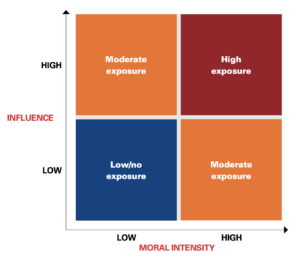
The authors have developed an approach which identifies key factors driving ““corporate human rights strategies and used them to create an exposure” scale. This tool captures both the moral intensity and the potential influence of a company in a specific situation.” Understanding where your organization lies on such a scale can assist a Chief Compliance Officer (CCO) or compliance professional to not only lead a discussion but more importantly help to formulate a corporate response. The twin axis are moral intensity and influence. Moral intensity “captures the degree to which people see a situation as unethical and demanding of action.” Some of the questions you need to consider include what is the magnitude of consequences? The extent of the harm likely to result? What is the social consensus, the extent to which people agree on the moral rights and wrongs of an issue? What is the probability of effect and how likely is harm to happen? What is the “Temporal immediacy. How urgent is the issue? Is fast action required to prevent harm?” How near is your organization to the issue and what part of your stakeholder communities will be affected by the issue?
The authors believe that determining influence is even trickier. They believe a nuanced approach should be used when assessing an organization’s influence. Their approach includes reviewing institutional factors, then understand “What are the formal and informal rules and values that shape the environment, including willingness — or pressure — to conform?” Next look at some industry specifics to help understand “How is influence affected by factors such as the complexity of supply chains, the geographic location of where vital products are sourced, or the degree of concentration or fragmentation of the industry?” From there review your resources to help understand “What can the organization bring to bear to influence the issue?” Such a review would look at both “tangible resources, such as funds, inventory, land, and buildings;” as well as “intangible ones, such as networks, skills, and knowledge.” Finally, consider embeddedness, which is “How closely and on how many levels is the company entangled with the perpetrators of abuse?”
Tomorrow we will look at how you can create a corporate human rights strategy for your corporate compliance regime or ESG program based upon the authors’ model.
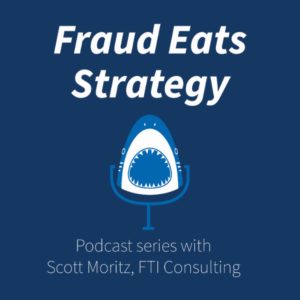
Human trafficking is the fastest-growing transnational crime with more than 25 million people held in forced labor and sexual exploitation. As if these numbers aren’t horrifying enough, 10 million of those trafficked people are children, and yet rarely are US organizations focused on human trafficking’s impact on their operations, much less society as a whole. In fact, most of us consider human trafficking to be a problem occurring in developing countries and that there are more pressing issues that should demand our attention and compliance resources. That false narrative is part of what makes human trafficking so difficult to counter.
>
Join us each week as we take a deep dive into the various forms of fraud across the world and discuss crime families, penny stock boiler rooms, international money launderers, narco-traffickers, oligarchs, dictators, warlords, kleptocrats and more.
Scott Moritz is a leading authority on white-collar crime, anti-corruption, and in the evaluation, design, remediation, implementation, and administration of corporate compliance programs, codes of conduct. He is also considered an authority in the establishment, training, and oversight of the investigative protocols carried out by financial intelligence, corporate security, and internal audit units.

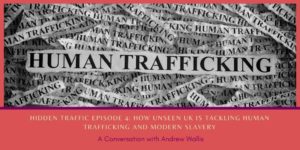
Andrew Wallis is CEO at Unseen UK, a charity dedicated to eradicating modern slavery wherever it is found, and bringing safety, hope, and choice to the survivors of human trafficking and modern slavery. Andrew is a member of several boards for organizations that seek to end labor abuse, advocate for human rights and social justice, and enforce ESG. He discusses how Unseen is fighting modern slavery, and how leaders can do their part.
Unseen works with all the major statutory agencies to assist victims of human trafficking and slavery that are identified within the UK. They help paramedics and local government develop a more victim-based approach, tackle forced labor within business’ supply chains, and run the UK’s modern slavery helpline, which is a fully manned, 24/7 operation. The helpline receives calls from victims, concerned members of the public, police officers, and businesses. It’s critical that the call handlers understand the need for the victims’ confidentiality, as well as the legislation necessary to extricate them from their circumstances.
“There isn’t an industry sector or country that isn’t impacted by the issue of human trafficking,” Andrew claims. “I’ve stood in many conferences and told them that I wasn’t there to make them feel guilty; we’re all guilty. [We need to] get over [the guilt], and start thinking about how we’re going to get out of the mess we’ve built.”
Resources
Andrew Wallis on LinkedIn | Twitter
UnseenUK.org
ModernSlaveryHelpline.org
In this episode of the FCPA Compliance Report, I visit with Irene Kaushansky, Associate Director of Compliance and Operational Integrity at Global Fund to End Modern Slavery. Irene is passionate about the fight against Modern Slavery and Human Trafficking. She talks about the Fund and its mission in this podcast. Highlights of this podcast include:
- What is the Global Fund to End Modern Slavery? What is the problem of modern slavery?
- How does the organization accomplish this mission?
- Why is the private sector so critical to fighting this international scourge? How does the organization work with the private sector?
- What is some of the impact the Global Fund has achieved?
- How to get involved with the Global Fund.
Resources
Global Fund to End Modern Slavery
Irene Kaushansky on LinkedIn


